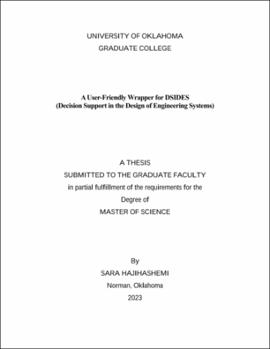A User-Friendly Wrapper for DSIDES (Decision Support in the Design of Engineering Systems)
Abstract
When dealing with complex systems, we need to consider that these systems have behaviors that are hard to predict or control, and uncertainties are always present since computational models are abstracts of reality. It is recognized that in many situations, it may not be possible to simultaneously optimize all objectives due to inherent conflicts, resource limitations, or uncertainty. As George E.P. Box said: "All models are wrong, but some are useful." The consequences of these observations are significant. We need to accept that our models might not capture everything and that uncertainties are a part of the picture. Hence, we must accept and deal with uncertainty instead of ignoring it and find solutions that are relatively insensitive to the uncertainties.
When choosing a method to work with, we need to consider the quality of our data. To make this all work, we need a method to find solutions that achieve a reasonable compromise or balance among the objectives and identify a set of solutions that are relatively insensitive to uncertainties. Also, be able to facilitate the exploration of solution space to support human decision-making. This ties into the problems we face in supporting decisions for complex systems. These problems involve choosing between options and making compromises.
The compromise Decision Support Problem (cDSP) construct and the Adaptive Linear Programming algorithm has been developed as a result, which was first introduced by Mistree and co-authors (1993). It is a domain-independent, multiobjective decision model based on mathematical and goal programming. They effectively deal with multiobjective problems involving bounds, linear and nonlinear constraints, goals, and consisting of Boolean and continuous variables. The requirements for this construct are:
1) Identify a set of solutions that are relatively insensitive to uncertainties
2) Facilitate the exploration of solution space to support human decision-making
Mistree and co-authors also designed a computer program to implement cDSP construct. It has been written in FORTRAN to identify robust satisficing solutions to design problems when the models are abstractions of reality. It is called DSIDES (Decision Support in the Design of Engineering Systems).
DSIDES is a software tool developed to help engineers and designers make better decisions in the design of complex engineering systems and provides decision support for the design of complex engineering systems.
In this thesis, our primary objective is to enhance the accessibility and user-friendliness of DSIDES by designing a user-friendly wrapper. Three key areas of focus are included in this thesis:
1) Exploration of cDSP Construct: In this part, the examination of the cDSP (Compromise Decision Support Problem) construct, including its structural components and the formulation of problem statements within the cDSP framework, has been discussed.
2) Comprehensive Analysis of the DSIDES Wrapper: A detailed exploration of the DSIDES wrapper and a step-by-step walkthrough of the wrapper's functionalities are covered.
3) DSIDES Software Program Manuals: Program manuals for the DSIDES software has been created. These manuals are helpful resources for individuals seeking to enhance, expand, or modify the software.
Based on these key areas of focus, there are three different parts to this thesis:
1) Part One: DSIDES Software and cDSP Construct: An Introduction.
2) Part Two: Designing the User-Friendly Wrapper for DSIDES.
3) Part Three: Program Manuals and Improvement of DSIDES.
In the following sections, all three parts and their related details are discussed, respectively.
Collections
- OU - Theses [2188]
